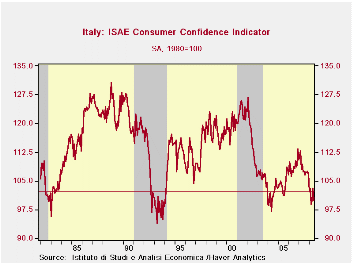 Global| Jun 24 2008
Global| Jun 24 2008Italy's Consumer Confidence Backs Off Again
Summary
Consumer confidence in Italy in June fell back to a raw reading of 100 after its unexpected spurt to 103.2 in May. As a result it is back near its April level of 99 and ensconced at a range percentile reading of 9.8. That is the [...]

Consumer confidence in Italy in June fell back to a raw
reading of 100 after its unexpected spurt to 103.2 in May. As a result
it is back near its April level of 99 and ensconced at a range
percentile reading of 9.8. That is the reading stands in the bottom 10
percent of its range of values since January of 1999.
If we take the headline of the confidence measure back in time
to 1991 (not all components go back in time as far), we find that it
stands in the bottom 9% of all observations over that longer sample
period. There is no disputing that confidence in Italy is low. 100 is
not a normal reading.
The components of the index are at low percentile in their
respective ranges with a few as really obvious exceptions. The prospect
for unemployment has risen to the 64th percentile (nearly the top THIRD
of its range). The overall situation over the last 12-months grades out
as being in the bottom five percentile of its range; for the next
twelve some improvement is expected as the measure stands in the bottom
36 percentile of its range. Price trends were in the 59th percentile
over the last twelve months and are expected to be essentially at the
40th range percentile in the next 12-months. The household budget in
the next 12-months is shot, standing on the bottom five percent of its
range.
The households’ overall financial situation was and remains
bleak. In the past 12 months households rated their financial situation
as in the bottom 2 percentile of its range; in the next twelve months
it rates at the bottom 3 percentile -- not exactly a party.
The time for major purchases is rated as the WORST EVER
currently. And it is expected to improve only to the bottom 12
percentile in the next 12months.
In the current situation savings behavior is called very
likely- a probable response to the financial uncertainty and to the
fact that is rated as the worst time to buy. So if you do not buy or
spend, you save. In the period ahead the savings environment is in the
bottom 25 percentile of its range.
For Italy the consumer situation remains in distress. The past
twelve months are rated as terrible by consumers. The period ahead is
expected to be still challenging but to show some improvement. It is
hard to say if this is hopeful thinking or a true expected outcome.
| Italy ISAE Consumer Confidence | ||||||
|---|---|---|---|---|---|---|
| Since January 1999 | ||||||
| Jun-08 | May-08 | Apr-08 | Mar-08 | Percentile | Rank | |
| Consumer Confidence | 100 | 103.2 | 99.8 | 99 | 9.8 | 109 |
| Last 12 months | ||||||
| OVERALL SITUATION | -82 | -81 | -85 | -84 | 4.8 | 111 |
| PRICE TRENDS | -11 | -15 | -17 | -17.5 | 59.2 | 52 |
| Next 12months | ||||||
| OVERALL SITUATION | -16 | -9 | -28 | -35 | 36.5 | 55 |
| PRICE TRENDS | 19.5 | 19 | 20 | 23 | 39.8 | 57 |
| UNEMPLOYMENT | -5 | -3 | 3 | 6 | 64.1 | 59 |
| HOUSEHOLD BUDGET | -1 | -3 | 0 | -2 | 5.6 | 110 |
| HOUSEHOLD FIN SITUATION | ||||||
| Last 12 months | -55 | -53 | -56 | -55 | 2.0 | 112 |
| Next12 months | -15 | -10 | -14 | -16 | 3.3 | 113 |
| HOUSEHOLD SAVINGS | ||||||
| Current | 73 | 68 | 58 | 54 | 100.0 | 1 |
| Future | -38 | -38 | -48 | -45 | 25.6 | 107 |
| MAJOR Purchases | ||||||
| Current | -64 | -51 | -47 | -50 | 0.0 | 114 |
| Future | -69 | -56 | -58 | -65 | 12.9 | 96 |
| Total number of months: | 114 | |||||
Robert Brusca
AuthorMore in Author Profile »Robert A. Brusca is Chief Economist of Fact and Opinion Economics, a consulting firm he founded in Manhattan. He has been an economist on Wall Street for over 25 years. He has visited central banking and large institutional clients in over 30 countries in his career as an economist. Mr. Brusca was a Divisional Research Chief at the Federal Reserve Bank of NY (Chief of the International Financial markets Division), a Fed Watcher at Irving Trust and Chief Economist at Nikko Securities International. He is widely quoted and appears in various media. Mr. Brusca holds an MA and Ph.D. in economics from Michigan State University and a BA in Economics from the University of Michigan. His research pursues his strong interests in non aligned policy economics as well as international economics. FAO Economics’ research targets investors to assist them in making better investment decisions in stocks, bonds and in a variety of international assets. The company does not manage money and has no conflicts in giving economic advice.






